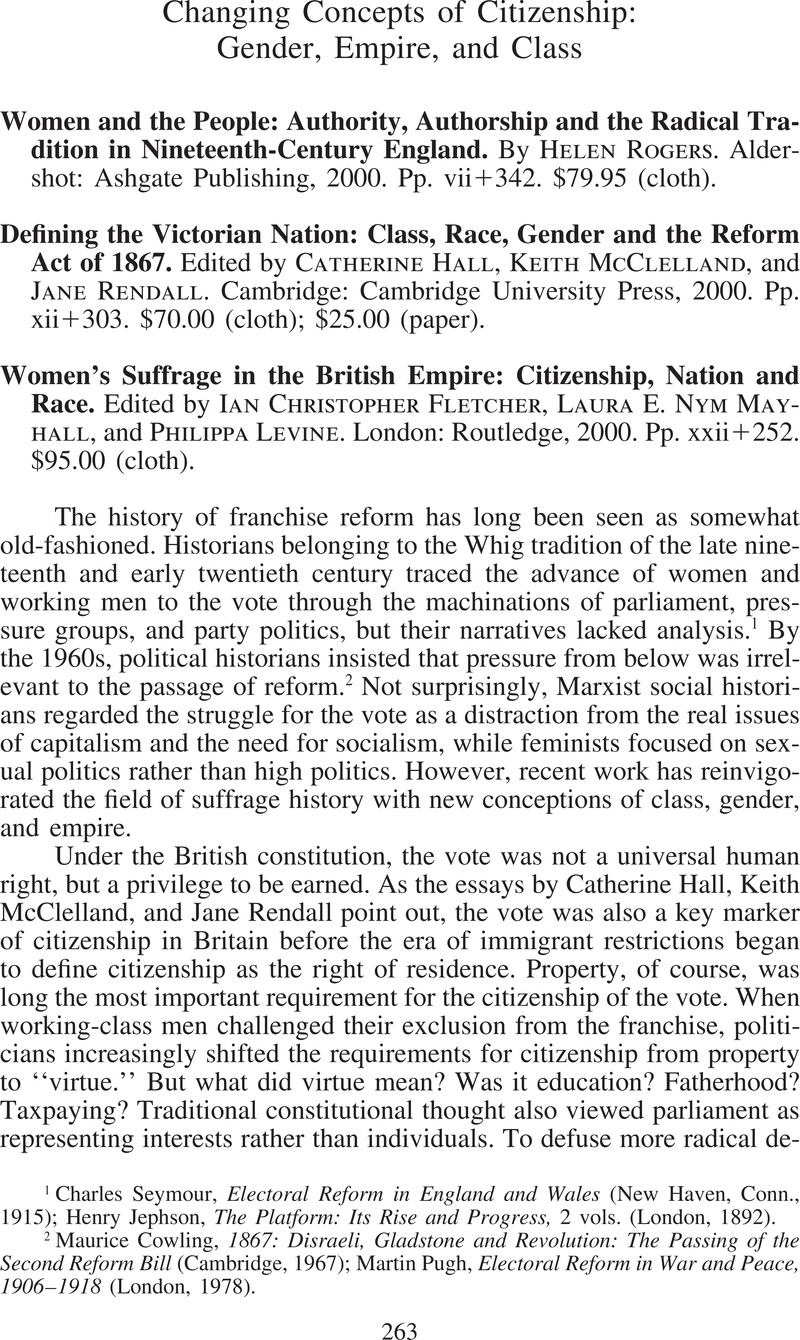Article contents
Changing Concepts of Citizenship: Gender, Empire, and Class - Women and the People: Authority, Authorship and the Radical Tradition in Nineteenth-Century England. By Helen Rogers. Aldershot: Ashgate Publishing, 2000. Pp. vii+342. $79.95 (cloth). - Defining the Victorian Nation: Class, Race, Gender and the Reform Act of 1867. Edited by Catherine Hall, Keith McClelland, and Jane Rendall. Cambridge: Cambridge University Press, 2000. Pp. xii+303. $70.00 (cloth); $25.00 (paper). - Women's Suffrage in the British Empire: Citizenship, Nation and Race. Edited by Ian Christopher Fletcher, Laura E. Nym Mayhall, and Philippa Levine. London: Routledge, 2000. Pp. xxii+252. $95.00 (cloth).
Published online by Cambridge University Press: 21 December 2012
Abstract

- Type
- Reviews
- Information
- Copyright
- Copyright © North American Conference of British Studies 2003
References
1 Seymour, Charles, Electoral Reform in England and Wales (New Haven, Conn., 1915)Google Scholar; Jephson, Henry, The Platform: Its Rise and Progress, 2 vols. (London, 1892)Google Scholar.
2 Cowling, Maurice, 1867: Disraeli, Gladstone and Revolution: The Passing of the Second Reform Bill (Cambridge, 1967)CrossRefGoogle Scholar; Pugh, Martin, Electoral Reform in War and Peace, 1906–1918 (London, 1978)Google Scholar.
3 Hall, Catherine, “Rethinking Imperial Histories: The Reform Act of 1867,” New Left Review 208 (1994): 3–29Google Scholar; McClelland, Keith, “Rational and Respectable Men: Gender, the Working Class and Citizenship in Britain, 1850–1867,” in Gender and Class in Modern Europe, ed. Frader, Laura and Rose, Sonya (Ithaca, N.Y., 1996), pp. 280–93Google Scholar.
4 Hansard, 3d ser., 183, 31 May 1866, col. 1642; for a discussion see Clark, Anna, “Gender, Class and the Nation: Franchise Reform in England, 1832–1928,” in Rereading the Constitution, ed. Vernon, James (Cambridge, 1996), p. 239Google Scholar.
5 Burton, Antoinette, Burdens of History: British Feminists, Indian Women, and Imperial Culture, 1865–1915 (Chapel Hill, N.C., 1994)Google Scholar.
6 Guinier, Lani, The Tyranny of the Majority (New York, 1994)Google Scholar.
7 Hall, Catherine, “The Rule of Difference: Gender, Class and Empire in the 1832 Reform Act,” in Gendered Nations: Nationalisms and Gender Order in the Long Nineteenth Century, ed. Blom, Ida, Hagemann, Karen, and Hall, Catherine (Oxford, 2000), pp. 107–36Google Scholar.
8 Seymour, Electoral Reform, p. 249.
9 See also Fitzgerald, James Edward, The Native Policy of New Zealand: A Speech Delivered in the House of Representatives of New Zealand August 6, 1862 (Wellington, 1862), reprinted in Clark, Anna and Richardson, Sarah, eds., The History of Suffrage, 1760–1867, vol. 6 (London, 1999)Google Scholar.
10 Vernon, James, Politics and the People (Cambridge, 1993), pp. 92, 156Google Scholar.
11 For a detailed examination of these debates, see Pearson, Gail, “Reserved Seats—Women and the Vote in Bombay,” in Women in Colonial India, ed. Krishnamurty, J. (Delhi, 1989), pp. 199–217Google Scholar.
- 1
- Cited by




